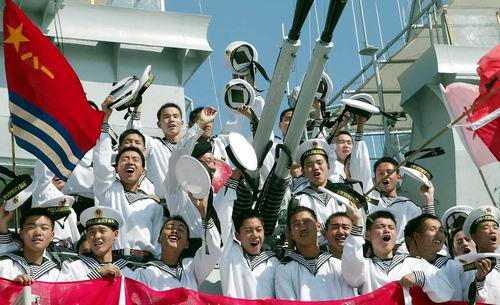
Navy sailors on a warship that docked in Shanghai are inspired by the
good news of the successful launch of Shenzhou VI yesterday morning.
-Xinhua
With the world watching, China's second manned spacecraft lifted off from the
Jiuquan Satellite Launch Center in the Gobi Desert yesterday morning, and moved
into orbit around the Earth.
Two astronauts aboard Shenzhou VI will travel in space for five days.
After their first meal in space at about 11am, one astronaut was taking a nap
at the order of the ground control center. Fei Junlong, 40, and Nie Haisheng,
41, both air force colonels, will sleep in turns during their mission.
Fei entered the orbital capsule from the return capsule at around 6pm
yesterday, nine hours after lift-off, marking a significant breakthrough for
China's space technology.
The move allowed Fei to shake off his heavy space suit and conduct
experiments and scientific research in work clothes in the capsule.
Nie in the return capsule took pictures of the orbital capsule with a digital
camera after taking off his space suit and putting on blue work clothes.
Over the next five days, one of them will be on duty in the re-entry module
while the other will be doing some scientific experiments in the orbital module,
according to Hu Yinyan, a chief astronaut training official.
The team is going to finish 110 manual operations. Fei is acting as the
captain, in charge of giving most preset orders to the systems aboard.
The magnetic recorder, or "black box," that disengaged from the Long March
IIF rocket, was found in northern Inner Mongolia 45 minutes after the blast-off.
The recorder, spotted by a local herdswoman and crucial to retrieving data
that telemetry fails to obtain, will be sent to Beijing for analysis.
Nearly 10 minutes after Shenzhou VI lifted off at 9am, the rocket carried the
capsule into a preset orbit. Three of the four ejected boosters have been found,
and the remaining one is still being searched for.
About 40 minutes after lift-off, the chief commander of China's manned space
program declared the launch a success.
TV pictures showed the duo comfortably performing flips and reading flight
manuals, indicating that they felt at ease and more comfortable than almost
motionless Yang Liwei.
Yang, China's first astronaut, said he had felt a strong tremor about two
minutes after lift-off.
Yang watched the lift-off at the Jiuquan launch center together with top
Chinese leaders including Premier Wen Jiabao.
Now deputy chief of the astronaut program, Yang dropped out of the second
manned mission to make way for his colleagues.
Spending on the Shenzhou series of spacecrafts has reached roughly 20 billion
yuan (US$2.3 billion).



